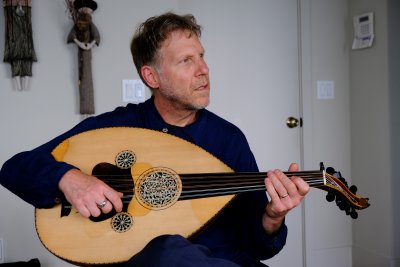Music is a path of healing and a way of life, simply listening to music has many benefits such as facilitating meditation and deep relaxation, or just enjoying the enhancement of mental focus and openness to artistic inspiration. Medicinally, more is being discovered about the benefits of music therapy for heart ailments, brain dysfunction, learning disabilities, depression, PTSD, Alzheimers, childhood development, and so much more.
Dr. Richard Gold, Executive Producer, was one of the four founders of the Pacific College of Oriental Medicine, and was first introduced to meditation and yoga in 1970. He has studied neuroscience and the evolving understanding of the effects of sound and meditation on the brain.
What you will hear is the four “sublime states” – the Brahma-viharas, a blend of voices and musical instruments from around the world, coming together to create beautiful original music informed by ancient wisdom promoting healing and well-being through sound.
Yuval Ron, composer, arranger and producer, is a renowned World Music artist, educator, peace activist and record producer. He graduated Cum-Laude in 1989 from the Berklee College of Music. He has continuously researched various ethnic musical traditions and spiritual paths worldwide and has composed TV and films scores as well as original scores for theater productions. He is a multi-instrumentalist, on this album he plays keyboards, Oud and conducts the string orchestration.
In a recent conversation with Dr. Gold, Yuval Ron and Beth Hilton, (https://www.youtube.com/watch?v=O_DMYDn-I8A), Yuval Ron spoke about the process of developing the Four Divine States of Mind project, expressing Four Buddhist beliefs, as a universal message of world spirituality and guidance towards realizing a more positive world. “The first idea was Mantra chanting. Then, I knew the album would not be instrumental, it would be vocal, and I thought, who would I want to sing these four vocal messages? I decided there would be four female divas to express these teachings… Who would be the most thoughtful singer in the world to sing about compassion?” The answer that came through: the Flamenco singer Estrella Morente, from Spain. “Then I was thinking about Deva Premal, I love her voice for chanting and mantras, she studied Sanskrit from a very young age… I wanted her to sing the song about vicarious joy.” He continues, “Then I thought about Úyanga Bold, who is a singer from Mongolia, from a Shamanic Buddhist background and is at the beginning of her career.” To complete this incredible team: “Chloe Pourmorady, a Persian-American singer also at the beginning of her career, she is from Los Angeles, she sings in many different languages… I chose her because when I heard her sing, I felt her soulfulness, tenderness and vulnerability, which I felt best expresses the idea of loving kindness.”
Loving-kindness is the practice concerned with the cultivation of benevolence, kindness, and amity, with silent repetitions of phrases such as “may you be happy” or “may you be free from suffering.” The practice of loving kindness expresses benevolence towards all living beings, joy at the sight of the virtuous, compassion and sympathy for the afflicted, and tolerance towards the insolent and ill-behaved.
“Loving Kindness” (12:56) (Metta)
From the album notes, “Dedicated to Deva Premal, whose soulful Mantra chanting gave the inspiration for this song.” The music is a meditation on Divine Love, motherly love, tenderness, abundance of kindness, and mother Earth.
Heard on the first track is the voice of Chloe Pourmorady, a Persian-American composer, multi-instrumentalist, singer, and educator best known for blending global ideologies and philosophies into her work. The music she writes is innovative and imaginative, influenced by tradition, and yet her sound has been described as “the music of her generation.” Her listeners describe feeling elevated through songs of hope, prayers of love, and words of truth.
With Alam Khan, Sarod; Rachel Valfer, Mawal (ad lib vocal solo); Somnath Roy, Ghatam; Malek Vossough, Ney; and Yuval Ron, Oud. Music and Lyrics by Yuval Ron.
An act of compassion can be defined as simply expressing creative helpfulness. Qualities of compassion are patience, wisdom, kindness and perseverance. Compassion involves being moved by suffering and feeling the motivation to help alleviate and prevent it.
“Compassion” (11:47) (Karuna)
Music and Lyrics by Yuval Ron, with an invitation to contemplate compassion, the suffering of yourself and others and try to cultivate a compassionate attitude towards these suffering beings.
For the second offering are heard the vocals of Estrella de la Aurora Morente Carbonell, professionally known as Estrella Morente. She is the daughter of flamenco singer Enrique Morente and dancer Aurora Carbonell. She has performed with her father since age seven and recorded her first album in 2001, Mi Cante Y Un Poema (My Songs and A Poem). This was followed the same year by Calle del Aire, and her third album, Mujeres (Women) came in 2006, which her father produced. Her art has dazzled not only the most demanding flamencologists but also rockers like Lenny Kravitz.
With Adam Del Monte, Guitar; Yuval Ron, Oud; Jamie Papish, Udu; Manuel Gutierrez, Back up vocals; Jose Ramon Montero, Translation of Spanish lyrics; Felipe Baron, Associate producer; and Pablo Sánchez, Recording engineer for Estrella Morente recording.
To show vicarious joy is to celebrate happiness and achievement in others even when we are facing tragedy ourselves. The foundation for letting joy into our lives is gratitude and the associated savouring of what is good in life such as achievements, friendships or your child’s development. Vicarious joy is the experience of the pleasure that comes from delighting in other people’s well-being.
“Vicarious Joy” (14:34) (Mudita)
Deva Premal, Vocals; with Pandit Nayan Ghosh, Sitar; Somnath Roy, Percussion; Yuval Ron, Oud; Kamal Engels, Recording engineer for Deva Premal recording; and Raya and Chinmay, Recording engineers for Pandit Nayan Ghosh recording. Music by Yuval Ron, Lyrics from the traditional Sanskrit.
The vocalist Deva Premal explains that the purpose of her work “is to be open to the Goddess of music – to be true to ourselves, as musicians, as ‘teachers;’ as partners, and ultimately, as individuals – fellow travellers. We accomplish this by not ‘trying’ to accomplish anything. Our nourishment and life’s work is to create gatherings around the planet where people can come together in celebration and meditation, to work positively towards valuing and rejoicing in the good fortune of others, which in turn increases our own joy in life.” She began her journey with a mantra in her mother’s womb, as her father chanted to her daily. The mantras continued to be her bedtime lullaby after she was born. Many years later, she heard a friend singing one of her prenatal mantras and was inspired to put together an album. Premal met her partner in life and music, Miten, at the Osho International Meditation Resort in Pune, India in 1990, where she was studying reflexology, shiatsu, cranio-sacral therapy, and massage. They have been touring together since 1992, offering concerts and chant workshops worldwide. Premal and Miten recorded The Essence (1998) in her mother’s apartment in Germany, where she was born and where she first heard the Gayatri Mantra.
In many Yoga traditions, the virtue of equanimity can be one of the results attained through regular meditation, cultivating an evenness of mind, calmness, and a strong sense of abundance, exaltation that is somehow immeasurable, without hostility and without ill-will, an evenness of mind, neither elated nor depressed.
“Equanimity” (14:36) (Upekkha)
Living and breathing music, and rather obsessed with improvement and self development of any kind, Úyanga Bold plays for healing experiences promoting mindfulness and personal transformation. She grew up playing classical piano, and later developed a fascination with exotic instruments, including dilruba, frame drum, and baglama saz to name a few. Known for her otherworldly dynamic voice on film, television and video game soundtracks, along with videos viewed by millions, Úyanga is an internationally acclaimed soundtrack vocalist, vocal arranger and songwriter.
Vocalist Úyanga Bold; with the Divine Sutra String Ensemble (cello soloist: Dennis Karmazyn); Hirokazu Kosaka and IKKYU Archers group, Sanskrit Chant of the Heart Sutra, bell and wooden sticks; Yuval Ron, Keyboards and strings orchestration; and Blair Studio Singers children choir conducted by KC Daugirdas, who sang on all four tracks. Music by Yuval Ron, Lyrics: traditional Sanskrit.
This new album from Metta Mindfulness Music brings a welcome and much needed meditation on the daily expression of loving kindness for healing a wounded world, resulting in increased relaxation and an intimate conversation, with gentle sharing of ideas. The sound is a meditation on bringing people of many cultures together through music in a prayer for universal welfare, experiencing a nourishing quality of interconnectedness, the wish to relieve a being from suffering, wishing fellow travelers on a spiritual journey happiness, to open our eyes to the rivers of goodness in the world and to enhance our sense of gratitude.
May all beings be fulfilled and secure, may they be happy-minded, connecting with others in order to conversely experience renewal, support, and validation. Music can free us all from inordinate reactions to the changes and chances of the world, to help us to cultivate the capacity to be joyful for the joy of others and to experience vicarious joy, all beings sharing that same location.
Available starting July 18, 2020 as hi rez tracks (48hz) from Amazon, Tidal, YouTube, and http://mettamindfulnessmusic.com/fourdivinestates.html
TRACKS
1 Loving Kindness (12:56)
2 Compassion (11:47)
3 Vicarious Joy (14:34)
4 Equanimity (14:36)
Video: https://www.youtube.com/watch?v=vxkydrF3XAg
Four Divine States of Mind
Yuval Ron
METTA MINDFULNESS MUSIC
Available starting July 18, 2020:












Read 0 comments and reply